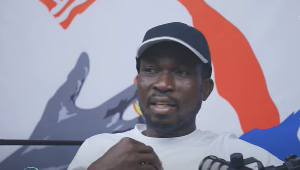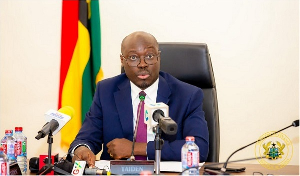“The Ghanaian Mentality Factor”
By Otchere Darko
“Dr K Botchway is not at fault neither are the forex Bureaus What is at fault is our mentality that anything from " abroad " is better and then our dogmatic idea that if govt direct economic activity that is communism The committe would better serve the country identifying industries where we have comparativer advantages if we produce internally and promote external markets for these. The private person does not have the capital and the know;edge to do the research. Nkrumah set the stage unfortunately the carbal that ruled after him just condemned everything and started a wholesale importation. Kutu Acheampong also tried it but failed . We are now a dumping ground for foreign goods. Please blame not Mr Botchway nor the Bureaus but our mentality and the fact we are not resilient . We want quick money. Why should we still be importing rice and chicken . We closed down Pokoase and closed Cattle development Board . How many Sugar factories and Sugar Cane Plantations did we not abandon?Recently we put up for sale The Tire factory and Glass factory . TOR is deep in debt and GIA is grounded, Can we blame the easy acccess to Forex burueaus for these or our inability to run things properly.” **[Comment by Kojo Tamakloe, copied verbatim]**
The above was culled from a few comments to an article I posted on Saturday concerning our Forex Bureaus. The reason for selecting it is because this particular comment touched on a very crucial factor which is affecting Ghana’s development. This factor is “the Ghanaian mentality”. Mr Tamakloe’s comment, in my opinion, touched on only one aspect of this Ghanaian mentality: our preference for “things from abroad”. There is another aspect of this “Ghanaian mentality” which is not covered by the comment above. This is the aspect of our mentality that “sees things that belong to the State as ‘things that belong to nobody’ and, therefore, can be squandered”. This write-up dwells on these two aspects of the “Ghanaian mentality”. Meanwhile, though, I want to say that my article on Forex Bureaus did not aim at blaming Dr Kwesi Botchwey, whom I admire profoundly. It also did not blame traders who use the scarce foreign exchange generated through the Forex Bureaus to import foreign consumer goods to flood our markets. The article was blaming and criticising all Ghanaian Governments since the inception of the Forex Bureaus, for failing to put in place mechanisms to direct and control what can be imported with these privately generated foreign currencies that pass through the Forex Bureaus. Where there is “uncontrolled freedom”, people will import what they like to import to sell; and people will, also, buy what goods they like to buy with their money. The Government in any country has a duty to find a “legal way” to “balance things” to protect home industries. Even the American Government does this through various ways, including the use of taxation.
Now, to our “Ghanaian mentality” issue: The phenomenon of “Ghanaian mentality” is mentioned a lot in connection with many things. In the above comment, its association with the failure of Ghanaian industries and products to compete with foreign ones is very much talked about, even though little is done by the Government to tackle the problem in one way or the other. Our “preference for foreign things” is partly inherited from our colonial past. We have grown up to feel that the Whiteman is superior to the Blackman, or the African. This colonial mentality has extended to include the belief that things produced by the Whiteman are better than things produced by the Blackman, or the African. This negative “African mentality” has to be fought and conquered; but this cannot be done by just condemning it. It has to be done through extensive “mind-engineering” and public education. It is a task that has to be handled by the Government through various media, including through all school curricula, from basic education to university.
Our “preference for foreign things” partly originates from “reality” and “logic”, rather than from psychology or fantasy. Helped by years of technological advancement, goods produced by the advanced countries tend to be superior to goods produced locally. A consumer, being an “economic being”, will always act rationally and choose goods that better satisfy his consumption needs. So, sometimes Ghanaian consumers cannot be blamed for preferring foreign goods, where local goods are poor in quality and, sometimes, more expensive. The problem of “inferior products”, relative to those produced by companies competing with infant industries, has faced all newly developing economies. Soon after the second world war, Japan had to face economies that were producing more qualitative goods for the then post world-war world. Japanese goods were always ridiculed as “inferior”. Gradually, Japanese goods started to improve in quality, until today “made in Japan” has become synonymous with “quality”. Later, Taiwan was also seen everywhere as a country whose goods were poor in quality. Today, Taiwanese goods are considered better than goods produced by mainland China. A few years ago, even Ghanaians would not buy Chinese goods, because they were considered “rubbish”. Today, Chinese goods are considered better and cheaper than Ghanaian goods; and for this reason, Ghanaians choose them in preference to our own goods. Ghanaian goods will continue to be “rubbished”, and perhaps for good reasons, until Ghanaian producers make efforts to improve the quality of “made in Ghana goods”. The blame here, then, should lie with Ghanaian producers who never make efforts to improve the quality of the goods they produce to sell in Ghana, which has now become part of a big global market. *Having said this, I have to add that it is the duty of the Government of Ghana to find “legal ways” to help local industries, during the difficult “infant years”, when they just cannot compete with their foreign counterparts, in terms of cost of production or quality of products.
It is the Ghanaian mentality that “sees things that belong to the State as ‘things that belong to nobody’ and, therefore can be squandered”, which puzzles and compels me to believe that until this special negative mentality is eradicated in this country, it will be a waste of public resources for our Government to continue to establish, or maintain more commercial State enterprises. In the quoted comment above, mention is made of “closed down Pokoase”, “closed [down] Cattle development Board”, closed down “Sugar factories”, abandoned “Sugar Cane Plantations”, recently put-up for sale “Tire factory and Glass factory”, “TOR [which] is deep in debt” and “GIA” [whose failure is widely known]. What the comment did not say is why all these State enterprises were either sold, or closed down; or why they continue to fail. To the list could be added Dr Nkrumah’s “workers brigade”, the “State Farms”, Nsawam cannery, and several others that cannot be enumerated here. Dr Nkrumah was a leader who had a genuine desire to develop the country through State enterprises; but, he stood alone in his dream of creating a prosperous Ghana through the State. The Ghanaian worker thought differently. He had a selfish mind and stole what he produced. Before Dr Nkrumah was overthrown, most of the State enterprises that he was trying to develop to form the basis of the country’s industrial development were being abused regularly; and, certainly, without his knowledge. Proceeds from the State Farms, for example, were being looted by the workers who worked in them. The workers brigade who should have epitomised Nkrumah’s dream of “socialist workers” was operating as if its members were pursuing their individual business goals. It is on record that the Managing Director of the Meat Factory, which the comment above partly refers to, chartered and flew alone a plane from Accra to Bolagatanga where its Head office was based. Would a Managing Director of an infant company in America charter a plane to fly him alone from one State in America to another State that covered the same distance as Accra to Bolgatanga? It is also an open secret that workers of GIA, as well as its predecessor, the former Ghana Airways, used their positions to engage in external trade without paying freight charges. As a result of these self-interests, these GIA workers never care[d] about their airline itself. *Why would foreign airlines want to fly the Ghana route, if this route was unprofitable? Why has Tema Oil Refinery been failing? Is it also because Ghanaians prefer foreign products? Until Ghanaians begin to see what belongs to the State as their own and begin to protect State enterprises in the same way that they would protect their own businesses, State companies and other State enterprises will continue to fail and force selfish politicians to sell, and get the opportunity to “buy them cheap”... which is one more proof of our disregard for what belongs to the State.
Source: Otchere Darko; [This writer is a centrist, semi-liberalist, pragmatist, and an advocate for “inter-ethnic cooperation and unity”. He is an anti-corruption campaigner and a community-based development protagonist. He opposes the negative, corrupt, and domineering politics of NDC and NPP and actively campaigns for the development and strengthening of “third parties”. He is against “a two-party only” system of democracy {in Ghana}....... which, in practice, is what we have today.]
Opinions of Monday, 17 January 2011
Columnist: Darko, Otchere














